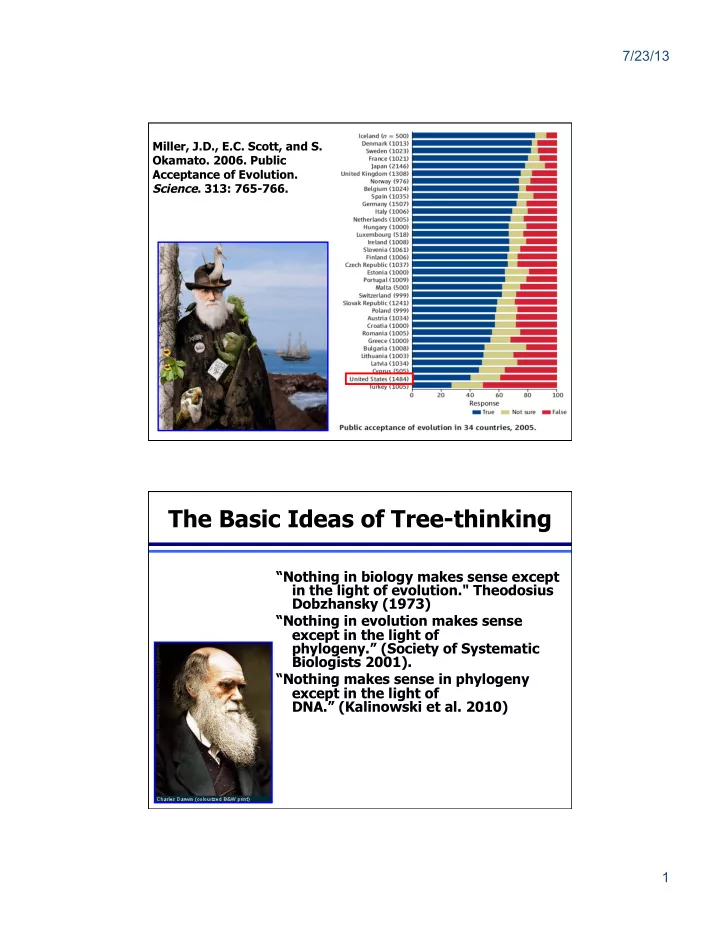

7/23/13 Miller, J.D., E.C. Scott, and S. Okamato. 2006. Public Acceptance of Evolution. Science . 313: 765-766. The Basic Ideas of Tree-thinking “Nothing in biology makes sense except in the light of evolution." Theodosius Dobzhansky (1973) “Nothing in evolution makes sense except in the light of phylogeny.” (Society of Systematic Biologists 2001). “Nothing makes sense in phylogeny except in the light of DNA.” (Kalinowski et al. 2010) 1
7/23/13 Tree-Thinking Tree-Thinking 2
7/23/13 What we want to know • Question #1: What is the relationship between ability to read phylogenetic trees relate and acceptance of evolution? • Question #2: How does student understanding of natural selection and genetics relate to understanding and acceptance of evolution? • Question #3: Will a tree-thinking based curriculum using active learning modules improve student understanding and acceptance of evolution and evolutionary theory? BIOL 1134 Evolution, Ecology, & Diversity 1 . Encourage understanding and appreciation for major, modern biological thought and theories: – Unity and diversity of life (DNA and genetic variation) – History of life (evolution and phylogeny) – Relationship between structure and function (adaptation) – Focus on life at the individual, population, community, and ecosystem levels (hierarchical organization, interdependence) 2. Develop student skills, understanding, and appreciation for the nature of science. – Thinking, reasoning, and problem-solving in biology. – Prediction and hypothesis testing in science. – Data collection, analysis, and interpretation – Group collaboration and interactions. 3
7/23/13 Tree-thinking Curriculum Structure DNA & Genetics Inheritance & Pedigrees Evolution Phylogenetics Concepts & Read & Construct Trees Mechanisms Application (Biodiversity surveys, adaptations, speciation etc.) Components of the curriculum. • Genetic basis of phylogeny & tree thinking: genetics, inheritance, and population genetics • Principles of tree-thinking: how-to of phylogeny construction and interpretation • Application of tree-thinking: opportunities to collect and analyze data, processes of hypothesis development and testing • Modules: Case study, group inquiry, active learning 4
7/23/13 Pedigree Analysis & Genetics Phylogeny of Domestic Dog Breeds – Result of Artificial Selection 5
7/23/13 Platypus Reproduction & Mammalian Evolution Pollination and Floral Evolution 6
7/23/13 Assessment & Evaluation • Measure of the Acceptance of the Theory of Evolution (MATE): 20 question Likert-scale survey (Rutledge & Sadler 2007) • Tree-thinking Challenge, Understanding Phylogenetic Trees, Tree Thinking Concept Inventory Variety of questions to read and construct phylogenetic trees. (Baum et al. 2005, Meir et al. 2007, Neagle 2009) • Concept Inventory of Natural Selection, Genetics Concept Assessment (Anderson & Fisher 2002, Smith et al. 2008) MATE pre-post Comparison * 100.0 * * 80.0 60.0 40.0 20.0 0.0 F09 pre F09 post S10 pre S10 post F10 pre F10 post S11 pre S11 post 7
7/23/13 Tree Reading Assessments 25 20 15 10 5 0 F09 pre F09 post S10 pre S10 post F10 pre F10 post S11 pre S11 post MATE & TTCI Spring 2011 120 100 80 MATE score 60 Pre-test Post-test 40 20 0 0 5 10 15 20 25 Tree-Thinking Concept Inventory score 8
7/23/13 MATE, Natural Selection & Genetics 120 100 80 MATE Score 60 Pre-test Post-test 40 20 0 0 5 10 15 20 25 30 35 40 Genetics & Natural Selection Concept Inventory Score Normalized Learning Gain 1 TRA/TTCI MATE Normailized Gain 0.8 0.6 0.4 0.2 0 F09 S10 F10 S11 -0.2 Curriculum 9
7/23/13 Acknowledgements • National Science Foundation – DUE #0940835 • The University of Oklahoma – College of Arts and Sciences, Department of Botany and Microbiology, Department of Zoology • J. Cooper, M. Jones, S. Rhodes, A. Makowicz, C. Poindexter, M. Gibson, D. Washecheck All research conducted under OU IRB# 12682 10
Recommend
More recommend